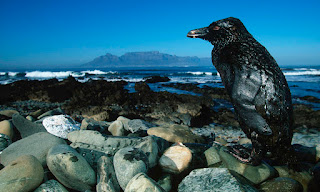 |
| WWF: oil covered penguin, South African coast |
The seven Arctic nations that make up the Arctic Council agreed to develop a plan for responding to oil and gas spills in the Arctic Ocean. The agreement reached at the biennial ministerial meeting in Sweden, if adhered to, will give some protection to Arctic wildlife and peoples, since it intends to fill the "response gap" by prepositioning of spill equipment. But it does not commit each country to cleaning up oil spills that will be inevitable as the rush to develop a melting Arctic begins. The agreement comes only five months after a near disaster took place on the southern coast of Alaska. Shell lost control of a drilling rig in heavy seas which grounded on a wildlife rich island near Kodiak, Alaska. By sheer luck, the rig was towed off without spilling significant amounts of oil. After this near mis and other problems with its exploration program, Shell called off Arctic drilling plans for this season and publicly recognized the importance of planning for spill prevention and clean up.
The nations did agree in the Kiruna Declaration also signed at the meeting to work together to achieve a binding legal agreement to limit the emission of heat producing greenhouse gases. The Arctic is warming twice as fast as other areas of the planet, so urgent action is needed. Environs were disappointed that immediate action was not taken to limit particle pollution from human combustion sources and methane, two potent climate pollutants.
